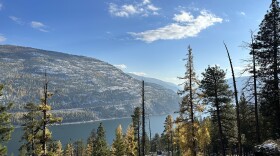A new report says a Canadian company that runs coal mines north of Montana hasn’t set enough money aside for cleanup. Those mines are sending pollution into Montana waters.
The report says that Teck Resources is three billion U.S. dollars short of ensuring future cleanup of the coal mines through a government required bond.
Those kinds of bonds are required from all mining companies in Canada and the U.S. to pay for cleanup efforts, even if companies go bankrupt.
Simon Wiebe is with Wildsight, the B.C. environmental group that commissioned the report. He said the company’s bond amount was negotiated behind closed doors.
Wildsight’s analysis estimates Teck would need $4.7 billion just to build water treatment plants for selenium. That doesn’t include other costs like replanting trees.
“If we don’t ensure that there are financial protections in place, then there’s potential for things to go downhill very quickly,” Wiebe said.
Selenium is already leaching from waste rock at the mine sites, leading to problematic levels in Lake Koocanusa and the Kootenai River in Montana.
In high enough concentrations, selenium can diminish fish reproduction and impact human health.
Teck disputes the report’s findings. B.C. officials didn’t comment on the report by deadline.
Wiebe said if the current bond fell short of the true cost of cleanup, water treatment could halt and selenium would spike downstream in Montana.
-
State utility regulators have rejected part of a petition to consider climate change in their decision-making; State regulators deny petition to for higher selenium standard in Lake Koocanusa; A Missoula homeless shelter closed last week as pandemic funding ends.
-
Lincoln County officials are asking state regulators to adopt a less restrictive pollution rule for selenium in Lake Koocanusa. The current standard has been controversial on both sides of the Canada-U.S. border, but multiple attempts to roll it back have failed.
-
The Montana Department of Justice is blocking access to what it calls privileged documents showing its communication with a Canadian mining company. An environmental group is now suing to access the information.
-
After years of tribes calling on the U.S. and Canada to do something about selenium pollution flowing into Montana, the two governments have struck a deal. An international body will make recommendations on how to settle the boundary-water dispute.
-
The U.S. and Canada have struck a deal over pollution flowing from British Columbia coal mines into a lake and river system in Montana.
-
A new study finds that Canadian coal mines contribute nearly all of the selenium found in Lake Koocanusa. For decades, coal mines along British Columbia’s Elk River have sent large amounts of selenium into Lake Koocanusa in northwest Montana.








